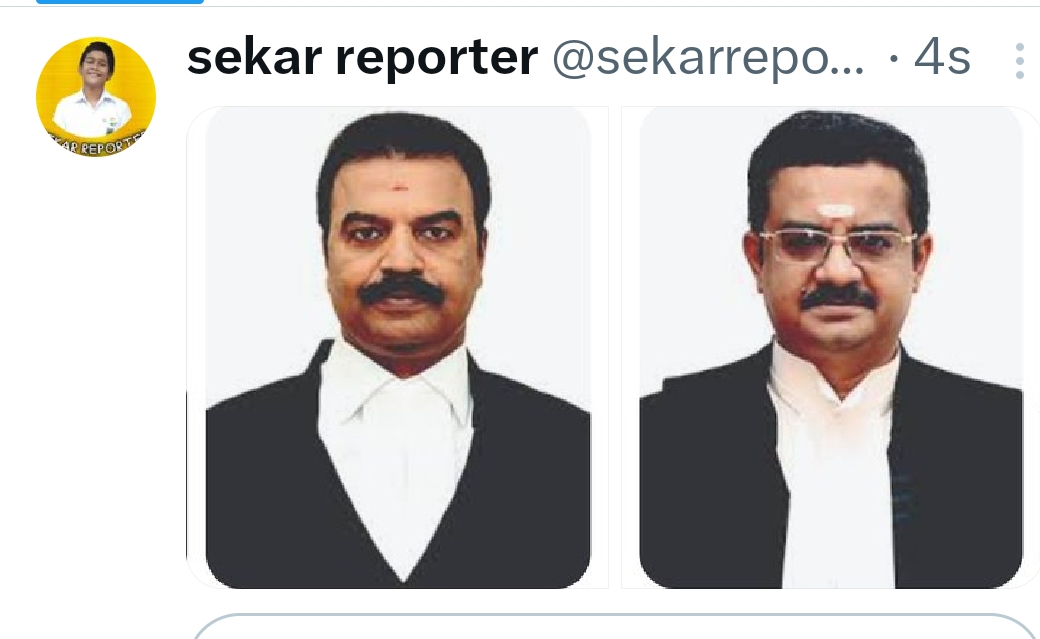“
HOME BHARAT WORLD EDITORIAL OPINION ANALYSIS CULTURE DEFENCE INTERNATIONAL EDITION RSS IN NEWS MAGAZINE READ ECOPY
Home Bharat
Tamil Nadu: Madras HC recognises Thevaram and Nalayira Divya Prabandam as cornerstones of Bharat’s cultural resurgence
In a significant move aimed at preserving Tamil Nadu’s rich cultural and religious heritage, the Madras High Court has directed the Hindu Religious and Charitable Endowments (HR&CE) department to form district committees to assess the condition of temples classified as ‘Padal Petra Sthalams’, ‘Vaippu Sthalams’, and ‘Divya Shetrams or Desams’
TS Venkatesan May 19, 2024, 10:33 pm IST
Madras High Court
In a landmark ruling, the Madras High Court emphasised the importance of the Thevaram and Nalayira Divya Prabandham in the resurgence and preservation of India’s cultural heritage. The special division bench, consisting of Justices R. Mahadevan and P.D. Audikesavalu, underscored that these sacred texts are essential for sustaining the traditions and practices integral to the nation’s identity.
The court’s decision highlighted the neglect faced by low-income temples, urging the Tamil Nadu government to submit a comprehensive status report on the condition of all temples classified as “Divya Desams” (the 108 abodes of Vishnu praised by Alwars) and “Padal Petra Sthalams” (temples glorified in the hymns of Saivite saints).
The ruling came in response to a petition filed by M. Karthikeyan of West Mambalam. Karthikeyan sought government intervention to protect temples from deterioration and allow devotees to engage in Uzhavarapani, a voluntary effort to clean and maintain temple premises. Despite a previous court order permitting such activities, the petitioner noted that authorities from the Hindu Religious and Charitable Endowments (HR&CE) department were obstructing these initiatives.
Justices Mahadevan and Audikesavalu criticised this neglect, stating, “The way in which the low-income temples are being neglected by the authorities shows a sorry state of affairs.” They stressed the vital role of community involvement in temple upkeep, particularly in maintaining temple tanks free from algae, waste, and plastic debris.
Justices R. Mahadevan and P.D. Audikesavalu wrote: “Hinduism, as coined by the British and known today, is an assortment of different cults with a polytheistic concept. Ancient scripts reveal that Buddhism and Jainism are also offshoots of Hinduism, with several common historical and legendary stories.”.
They said, “The temples in Tamil Nadu signify not only the sacredness but a reflection of the culture, tradition, too, as it also demonstrated the skill and techniques possessed by our ancestors in building the temples.”
the Madras High Court has directed the Hindu Religious and Charitable Endowments (HR&CE) department to establish committees in each district to inspect and report on the conditions of all temples classified as ‘Padal Petra Sthalams,’ ‘Vaippu Sthalams,’ and ‘Divya Shetrams or Desams.’ This directive aims to address the neglect and deterioration of these historically significant temples across Tamil Nadu.
The special division bench, comprising Justices R. Mahadevan and P.D. Audikesavalu, emphasised the urgent need to assess and improve the status of temple premises, including ponds, vegetation, and civil structures. The committees are required to document the condition of these temples and identify necessary repairs and maintenance tasks for pragarams (outer rings of temple premises) and gopurams (temple towers). The HR&CE department has been instructed to submit these reports within two weeks.
The court highlighted the importance of community involvement in temple upkeep, stating, “It is also clear from the rules that the participation of the public in the cleaning and maintenance activities is permissible.” The judges urged any Uzhavarapani voluntary groups interested in cleaning activities to apply, with requests to be considered within a week.
Upon receiving the necessary perm
